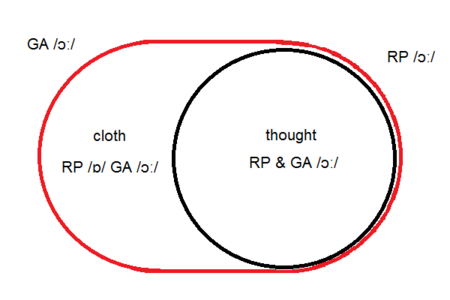✨Creating an account only takes 20 seconds, and doesn’t require any personal info.
If you’ve got one already, please log in.🤝
Difference between revisions of “Open-mid back rounded vowel”
(→Common words: sɒlt) |
(→Common words: Deleting duplicates) |
||
| Line 20: | Line 20: | ||
* with "a": water; | * with "a": water; | ||
* with "al": almost - already - alter - always - chalk - false - salt (also /sɒlt/{{bre}}) - talk - walk | * with "al": almost - already - alter - always - chalk - false - salt (also /sɒlt/{{bre}}) - talk - walk | ||
* with "all": ball - call - fall - hall - mall - small | * with "all": ball - call - fall - hall - mall - small - wall | ||
* with "aw": dawn - flaw - hawk - jaw - law - lawn - raw - saw - shawl - thaw - yawn | * with "aw": dawn - flaw - hawk - jaw - law - lawn - raw - saw - shawl - thaw - yawn | ||
* with "au": auction - August - author - autumn - cause - clause - daughter - fault - launch | * with "au": auction - August - author - autumn - cause - clause - daughter - fault - launch | ||
Revision as of 22:25, 22 September 2015
Open-mid back rounded vowel Open-mid back rounded vowel In Received Pronunciation, the IPA phonetic symbol /ɔː/ corresponds to the vowel sound in words like "north", "force", and "thought". Additionally, many people pronounce "sure" as /ʃɔːr/ instead of the more traditional /ʃʊər/. See IPA phoneme /ʊə/.
In General American this phoneme is heard in "north", "force", "thought", and also "cloth" (the latter is pronounced /ɒ/ in Received Pronunciation).
In Received Pronunciation /ɔːr/ is pronounced [ɔː] unless it is followed by a vowel, i.e. when the spelling has an "r", it is normally silent unless it is followed by a vowel.
In General American the "r" in /ɔːr/ is always pronounced.
There are places in the United Kingdom where /ɔːr/ is pronounced [ɔːr], and places in North America where /r/ is silent.
Common words
Some common words containing /ɔː/ include the following:
- with "oa": abroad - broad
- with "ough": ought - thought
- past tense and past participle: bought - brought - fought - sought - thought
- with "a": water;
- with "al": almost - already - alter - always - chalk - false - salt (also /sɒlt/BrE) - talk - walk
- with "all": ball - call - fall - hall - mall - small - wall
- with "aw": dawn - flaw - hawk - jaw - law - lawn - raw - saw - shawl - thaw - yawn
- with "au": auction - August - author - autumn - cause - clause - daughter - fault - launch
- past tense and past participle: caught - taught
/ɔːr/
See Pronunciation exercises: "orV" and "orrV"
Some common words containing /ɔːr/ include the following (note that the /r/ is silent in Received Pronunciation, unless it is followed by a vowel)
- with "or": afford - born - cork - door - floor - fork - horse - lord - more - nor - or - pork - score - short - store - storm - story - sword
- with "oar": boar - board - oar - roar - soar
- with "our": court - four - pour
- with "ar": quarter - war - warm - warn
- with "awer": drawer
Homophones
- All accents: bored - board; clause - claws; or - oar - ore; pause - paws; warn - worn;
- Only in non-rhotic accents: court - caught; source - sauce; stork - stalk.
- your /jɔːrBrE jʊərAmE jərBrE AmE/ - you're /jɔːrBrE jʊərBrE AmE jərAmE/
- What is the difference between a cat and a comma?
- A cat has its claws at the end of its paws and a comma has its pause at the end of its clause.
Anticipated pronunciation difficulties depending on L1
Preconceived ideas and other interferences from L1 obviously interfere in many cases with how students perceive - and pronounce - sounds/words in English. The following sections aims to point out some of the most typical difficulties teachers and students may encounter regarding pronunciation.
Spanish
Some Spanish speakers may, at first, have difficulty distinguishing between the vowel sound in "north" and that of /ɒ/, as in "not".
It is not uncommon to hear them pronouncing */ˈalsəʊ/ or */alˈtɜːrnatɪv/.
See also Pronunciation exercises: "au"#Spanish L1.
